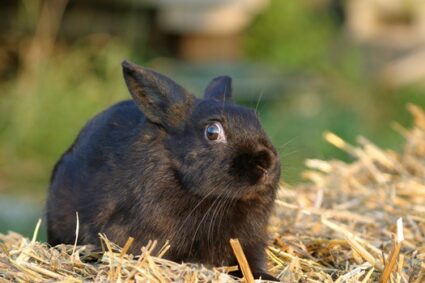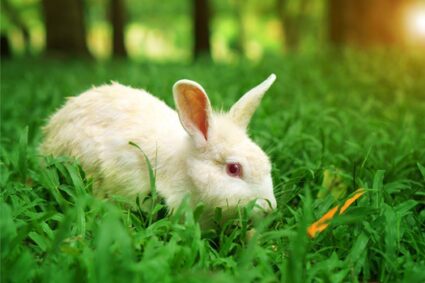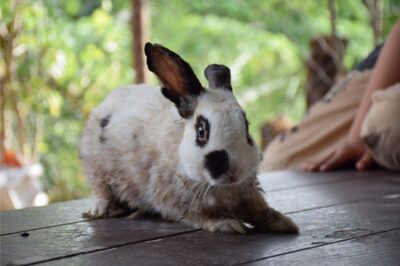Rabbits, whether running free in the wild or kept at home as domesticated pets, are nervous and anxious animals. Rabbits can become stressed because they’re so vulnerable. Even the most empathetic owner will spend many hours trying to reduce stress in rabbits.
Start with some gentle verbal reassurance. Wait for your rabbit to approach you. When she does so, offer comforting petting while still talking to her. Give your pet a treat and play games with her.
If your rabbit is particularly upset by something obvious, such as sudden louse noises, then you should do what you can to remove that stress trigger. Rabbits are anxious and worried creatures by nature, so you need to factor this into their living environment.
Is Stress Dangerous to a Rabbit?
Stress is life-threatening to a rabbit. Your pet is always on the lookout for a more aggressive, predatory animal that might eat her. She can’t cope with any additional worry and anxiety.
Rabbits are easy to stress out. While your pet may be feisty and bossy, she’s not well-placed to defend herself from danger and attack. She will be relying on you to keep her safe and calm.
If you leave a rabbit to cope with stress, then it could lead to a heart attack. Rabbits can be frightened to death. Cardiac arrest can be sudden or caused by a series of smaller shocks.
What Causes Stress to a Rabbit?
The list of things that can cause stress to a rabbit is exhaustive. They include:
Lack of Space
Your rabbit needs to live in a hutch that’s large enough to meet her needs. If a rabbit is cramped, she’ll become stressed. Follow the minimum size guidelines established by The House Rabbit Society.
Changes to an Established Routine
Rabbits are curious about new experiences, but they enjoy routine. If she knows when she’ll be fed and played with, she’ll be much calmer.
Travel
Avoid placing your rabbit into a pet carrier and moving her around. Sometimes, this will be unavoidable. If it’s unnecessary, leave your rabbit in her familiar surroundings.

Loud Noises
Rabbits have excellent hearing. Loud noises can startle and terrify rabbits.
Unexpected or Excessive Handling
Rabbits prefer to keep all four paws on the ground wherever possible. Do not handle your rabbit unless she welcomes it — many breeds of rabbit freeze in fear when cuddled.
Uncomfortable Temperatures
Rabbits need to maintain a body temperature between 101-103 degrees Fahrenheit. This is easier in cool temperatures. A rabbit that’s too hot will grow anxious and stressed.
Fear of the Dark
Rabbits are particularly fearful after dark. If your pet is alone in an outdoor hutch, she’ll hear what she cannot see. This may include potential predators, such as foxes.
Loneliness
Rabbits are social and dislike being alone. If your rabbit doesn’t have a mate, you must keep her company. Give your rabbit plenty of outside time, and regularly visit her.
Bereavement
Rabbits forge bonds with their owners, and other rabbits. If two rabbits live together and one suddenly disappears, the rabbit that remains will be anxious. The loss of an owner will have the same effect.
Boredom
Rabbits are smart. You won’t find any rabbit that’s happy to lounge around and do nothing. You must fill your pet’s hutch with toys for when she’s unable to explore.
Sickness or Pain
If your rabbit is sick, then she’ll be worried. In part, this will be because she is determined to hide her illness from you.
Restriction of Instinct
Domesticated rabbits are different from their wild counterparts, but they share instincts. If your rabbit cannot dig, run, climb or chew, she’ll suffer from stress.
Rabbit Anxiety Symptoms
Rabbits display stress and anxiety in many ways. One of the first things you should do is learn the warning symptoms of stress. These include:
- Hiding. Rabbits in the wild instinctively hide from threats. If your pet will not leave a safe space in her hutch, she is likely stressed.
- Thumping. Your rabbit may thump her back foot to get your attention. If she keeps doing it, she is anxious and worried.
- Grooming to Excess. Grooming is important to rabbits, but there are limits. If your rabbit is over-grooming herself, she is trying to self-soothe.
- Not Eating or Drinking. If a rabbit is stressed, she will not eat or hydrate. This becomes dangerous within 24 hours.
- Constipation. A rabbit that experiences stress and anxiety will struggle to poop. Don’t let this last beyond 24 hours. It may cause a blockage.
- Jumpy Demeanor. If your rabbit leaps out of her skin at any sound or movement, she is anxious. Watch for bulging eyes that seem overtly attentive, too.
- Breathing Heavily or Panting. Rabbits are obligate nasal breathers. If your pet breathes through her mouth, she is in serious distress.
How to Treat Stress in Rabbits
Do not allow stress to run its course. Even if your pet calms herself down, it may have a knock-on effect. Stressed rabbits become constipated, for example.
Start the process of calming your rabbit down with verbal cues. Speak to your rabbit in a soft, reassuring, singsong tone. Don’t display any sign of frustration or raise your voice in anger.
Get down to your rabbit’s level (not too close), and start to speak to her. Use short, reassuring phrases like, “it’s OK” and, “it’s only me.” Over time, you can imprint these words into your pet’s brain as common reassurance.
If your rabbit approaches you, start some light petting. Stroke body parts that you know your pet enjoys being touched. While doing this, you should try to identify the source of stress.
If it’s something that your rabbit is seeing, cover her eyes. If it’s a loud noise, cover her ears. Exposure therapy is not an advisable treatment for rabbits. It will just leave her more stressed.
Once your rabbit shows signs of calming down, introduce some pleasure to her life. Offer a treat, and play with her if. You are distracting your pet from her fear. Rabbits are mindful creatures. They’re happy to live in the moment. After a short time, your rabbit should return to her old self.
My Rabbit is Stressed After Moving
Moving house is considered to be life’s second-most stressful event, only topped by bereavement. Moving will leave her stressed as everything she knows is changing.
When you arrive at your new home, set up an area exclusively for your rabbit. Do not unpack anything of yours. Fill the room with items that your rabbit knows from your old property. She’ll take comfort from familiar scents and objects.
This will become your rabbit’s territory for the first few days of your move. Over time, she’ll explore the room. Once she has made her peace with this area, your pet will explore more. Let her check out each room in the house, one at a time.
You’ll need to be patient with a rabbit after moving house. Every pet adjusts to the change at a different pace. Eventually, she’ll start to consider your new house to be her home.
My Rabbit is Stressed After a Vet Visit
No pet enjoys going to the vet. It will be painful, and there will be lots of intrusive prodding and poking. Worst of all, the rabbit will not understand what is happening.
Valley Vets explains how to minimize the effect of a vet visit. Cover the view in your rabbit’s carrier, so she can’t see anything frightening. A waiting room filled with cats and dogs may finish her off.
Provide your pet with as many familiar props as possible. Fill her carrier with hay and a recognizable scent. If your rabbit responds well to Rescue Remedy, consider spraying this.
My Rabbit is Stressed Because the Streets are Noisy
If you live in an urban environment, you may find that you’re surrounded by background noise. This could be day-to-day noise, such as garbage vans or car horns. You may also hear road works, street parades, thunder, or fireworks.
Rabbits will always be skittish about loud, sudden noises. If your pet seems to be in a regular state of distress, consider rehoming her indoors. This will offer some measure of protection. It won’t solve everything, though.
Don’t house a rabbit by a TV or music system. If you have children, explain that they need to be aware of the rabbit. Sudden shouts or screams can spook your pet.
Create a safe space for your rabbit that is as soundproofed as possible. If you have a spare room, assign it your rabbit. Fill it with familiar scents and somewhere to hide, even if it’s just a cardboard box. This will at least give your rabbit somewhere to escape to and wait out the noise.
My Rabbit is Stressed Because Due to a Heatwave
Uncharacteristically hot weather is uncomfortable for rabbits. Although your pet sheds fur according to the seasons, she is not equipped for a heatwave. When a rabbit gets too hot, she grows increasingly uncomfortable and anxious.
Start by ensuring that your pet has plenty of water. You’ll need to be more on top of refilling water bowls and bottles than usual. Water can evaporate in high heat. Regularly check in on your rabbit, and add ice to her water, if necessary.
Eventually, you may need to consider moving your rabbit’s hutch. If she lives outdoors, moving the hutch to a shady area such as under a tree may help. At the very least, you’re getting her away from direct sunlight.
You need to think about airflow, though. If the temperature is so hot that your rabbit is struggling to breathe, bring her inside. A garage should be fine if it’s not damp and you have windows to open.
You may think that a fan is a good way to cool your rabbit, but it isn’t. Rabbits loathe drafts, and the constant blowing of air will stress her out. Just keep her cool and create a natural airflow.

My Rabbit is Stressed Since I Got Another Pet
Rabbits love company, especially of their own kind. This doesn’t mean that a new pet will not cause stress, though. Until two rabbits are bonded, they will be rivals. Introduce the animals slowly and steadily, and watch for signs of jealousy.
You will also need to ensure that you have enough space for two pets. Forcing two rabbits into a small hutch will stress both of them out. They will likely take out this anxiety on each other.
If your pet is of another species, your rabbit is more likely to feel anxious and concerned. Cats and dogs sometimes struggle to live with rabbits. These animals can forge a friendship, but bigger animals may instinctively chase a rabbit.
How to Reduce Stress in a Rabbit’s Life
Reducing stress in a rabbit’s day-to-day life is essential. Give a rabbit a reason to stress herself out and she’ll find it. Do whatever you can to grant your pet a serene existence. To ensure that your rabbit is cool and collected at all times, follow these steps.
- Establish a Routine. Make sure that your rabbit understands that her needs will be met. Rabbits are smart. They’ll notice patterns and rhythms, and learn to be patient.
- Let Your Rabbit Call the Shots. Rabbits are dominant by nature, so she’ll be happy.
- Attention and Affection. Never ignore your rabbit. This will harm your bond, and leave her wondering if you’re on her side. If your pet wants petting or grooming, provide it.
- Don’t Handle Your Rabbit Unnecessarily. Don’t pick her up for a cuddle unless she asks.
- Moderate Lighting and Temperature. Ensure that your rabbit has a good understanding of the difference between night and day. Don’t let her get too hot, either.
- Get Your Rabbit a Friend. If you’re able, it’s advisable to bring a second rabbit into your pet’s life. Once these two rabbits have bonded, they’ll continuously keep each other happy.
- Keep Your Rabbit Safe. If your rabbit lives outside, ensure she feels secure in her hutch at night. A rabbit that feels exposed to predators will live in a constant state of fear at night. Here’s some advice on keeping snakes away from your rabbit.
Never ignore warning signs of stress in rabbits. This will break your pet’s trust in you, and also damage her health. An anxious rabbit is more prone to disease and sickness.


Thank you….I have recently lost o e of my bunnies and am now doing all research I can to understand how to make my remaining bun get over it ..your advice has come in useful
Thank you for your advice. I’ve babysat my friends’ rabbits many times but this is my first time owning one and getting her calm and happy is one of my worries upon her joining our family. She comes to me when I am feeding her to get pets so I know we are moving forward but I worry when she’s out playing that she is too scared to approach humans but she wants to cuddle with the cat who is somewhat scared of her cuz she’s never seen a bunny so my cat runs a couple feet from her. I want to reassure my rabbit the best I can and keep her happy.